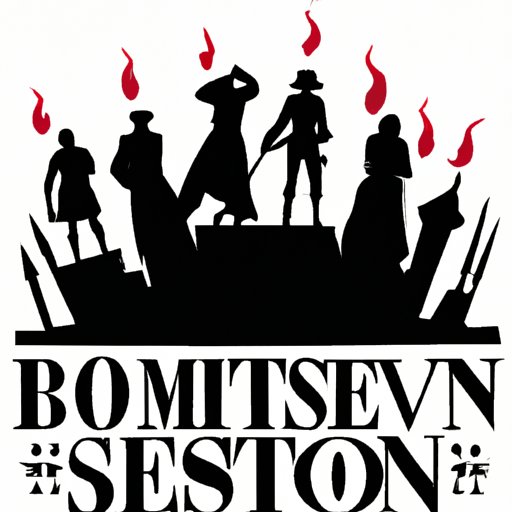Why the Boston Massacre Was Important: Exploring Political and Cultural Significance
The Boston Massacre, which took place on March 5, 1770, was a pivotal event in American history that has had a lasting impact on American culture and politics. The incident involved a deadly confrontation between British soldiers and American colonists, in which five colonists were killed and several more were wounded. This article aims to explore the historical, political, and cultural significance of the Boston Massacre and its ongoing legacy in American society.
A Historical Account
The Boston Massacre occurred in the midst of escalating tensions between American colonists and British troops stationed in colonial cities. In Boston, tensions had been brewing for months due to the presence of British soldiers, who were viewed as a symbol of colonial oppression. In the early evening of March 5th, a group of Boston colonists began taunting and throwing snowballs at a small group of British soldiers. The situation quickly spiraled out of control, and the soldiers fired into the crowd, killing five men and wounding others.
The Boston Massacre had an immediate impact on both the colonists and the British government. In Boston, angry crowds gathered to protest the killings. The British military authorities were forced to remove their troops from the city, and tensions continued to simmer throughout the colonies. Meanwhile, in Britain, the incident was viewed as an example of colonial violence and insubordination. The British government responded by sending more troops to the colonies and implementing harsher measures to control colonial unrest.
The Boston Massacre was part of a broader pattern of conflict between colonists and British troops that contributed to the outbreak of the American Revolution several years later. The incident served as a rallying cry for colonists who were growing increasingly frustrated with British rule and helped to fuel a growing sense of American identity and nationalism.
Impact on Colonial Politics
The Boston Massacre had a significant impact on colonial politics. The incident was widely publicized in the colonial press, and it became a focal point for anti-British sentiment and resistance. Many American colonists saw the event as evidence of British tyranny and oppression, and they used it to galvanize support for the American Revolution.
Politically, the Boston Massacre shifted the balance of power between British authorities and colonial leaders. Colonial leaders, who had previously been hesitant to confront British power, became more outspoken in their criticism of British rule. The incident also helped to pave the way for the development of more radical political movements, such as the Sons of Liberty.
Examples of how the Boston Massacre changed colonial politics include the successful defense of the British soldiers by colonial lawyer John Adams, who used the trial to argue against British rule and in favor of American independence. The event also inspired other acts of resistance and rebellion, such as the Boston Tea Party, which was organized by the Sons of Liberty and was a direct response to British attempts to maintain control over colonial trade.
The Role of Propaganda
The Boston Massacre was also notable for the role of propaganda in shaping public opinion about the event. Both the colonists and the British government used a variety of different mediums to disseminate their versions of what happened on March 5th, 1770.
Colonial propaganda, such as Paul Revere’s famous engraving of the event, portrayed the British soldiers as cold-blooded killers, intent on suppressing American freedom and liberty. On the other hand, the British government circulated accounts of the event that emphasized the unruly and violent behavior of the colonial crowd, framing the soldiers as innocent victims.
The power of propaganda to shape public opinion was a key theme throughout the American Revolution, and the Boston Massacre was an early example of this phenomenon. Propaganda was used to support different political causes related to the event, including the call to arms for the American Revolution and the demand for justice for the victims of the massacre.
Legacy of the Boston Massacre
The Boston Massacre has had a lasting impact on American society and culture. The event remains a potent symbol for various political causes, including the struggle for civil rights and the fight against authoritarian government. The Boston Massacre is also extensively studied by historians as a key moment in American history when tensions between colonists and British authorities reached a boiling point.
The legacy of the event can also be seen in the commemoration of the event. Every year, on March 5th, Bostonians commemorate the Boston Massacre with a reenactment of the incident and other events, such as panel discussions, lectures, and walking tours.
Comparing and Contrasting to Other Events
The conflict between citizens and government forces is a recurring theme in American history, and the Boston Massacre is just one example of this broader pattern of tension. Other events in American history that have involved conflict between citizens and government forces include the Whiskey Rebellion, the Civil Rights Movement, and the events at Standing Rock.
Comparing the Boston Massacre to these other events provides valuable insight for understanding American attitudes towards authority and government. The Boston Massacre, for example, was a pivotal moment in the development of American nationalism and the fight against colonial oppression. The Civil Rights Movement, on the other hand, was a struggle for equal rights and justice for marginalized and oppressed groups.
Conclusion
The Boston Massacre was a critical moment in American history that has had a lasting impact on American culture and politics. The event contributed to the outbreak of the American Revolution, shifted the balance of power between colonists and British authorities, and served as a powerful symbol for various political causes. The legacy of the Boston Massacre can be seen in the ongoing commemoration of the event and the extensive scholarly attention paid to its historical significance.
For those interested in learning more about the Boston Massacre, there are several excellent books and websites available that provide in-depth analysis of the event and its broader significance.
